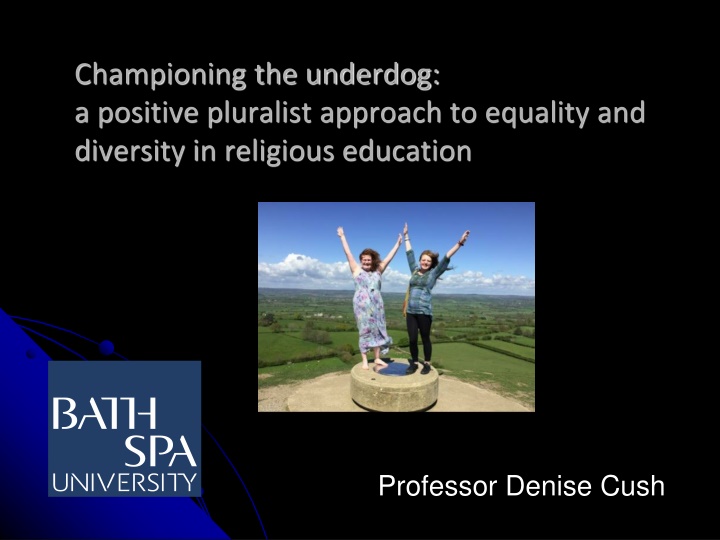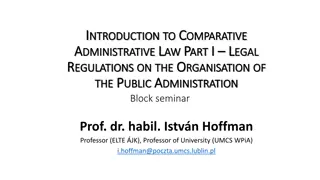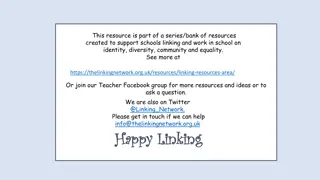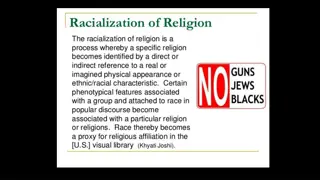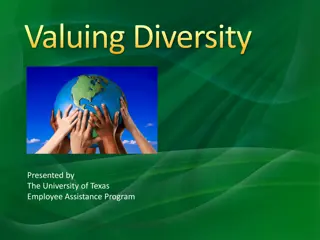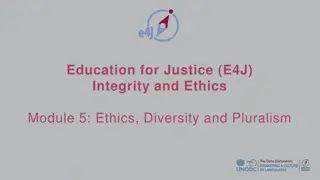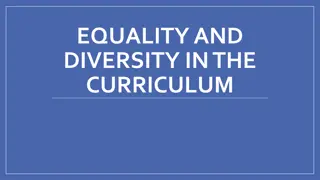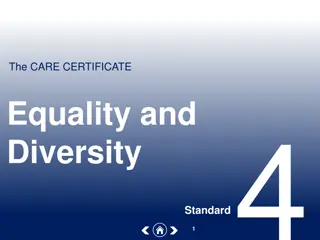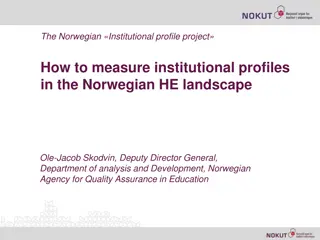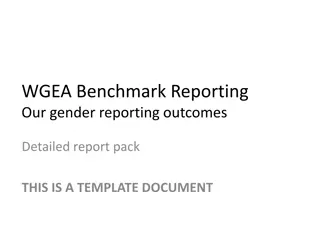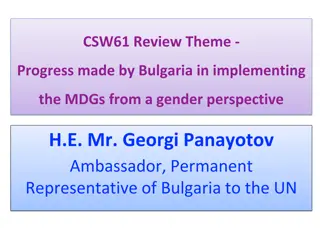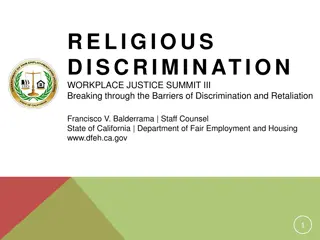Positive Pluralism in Religious Education: Embracing Diversity and Equality
This collection of reflections delves into Professor Denise Cush's exploration of Positive Pluralism in the realm of religious education. The approach emphasizes inclusivity, equality, and diversity, urging a shift towards a more open and accepting educational environment. Through various manifestos and analyses, the importance of recognizing and respecting different traditions and worldviews is underscored, promoting a harmonious coexistence within society. The manifesto's epistemologically humble stance and commitment to acknowledging real diversity provide a valuable framework for fostering understanding and mutual respect among individuals of various beliefs and backgrounds.
Download Presentation

Please find below an Image/Link to download the presentation.
The content on the website is provided AS IS for your information and personal use only. It may not be sold, licensed, or shared on other websites without obtaining consent from the author.If you encounter any issues during the download, it is possible that the publisher has removed the file from their server.
You are allowed to download the files provided on this website for personal or commercial use, subject to the condition that they are used lawfully. All files are the property of their respective owners.
The content on the website is provided AS IS for your information and personal use only. It may not be sold, licensed, or shared on other websites without obtaining consent from the author.
E N D
Presentation Transcript
Championing the underdog: a positive pluralist approach to equality and diversity in religious education Professor Denise Cush
Overview Initial Reflections on the title Positive Pluralism Pluralism, Diversity and Equality : religions, worldviews, school subjects Experience as a source of authority a feminist approach The Future of Religion and RE?
Initial Reflections Title of my PhD 2012 Analysis of publications 1986-2011. Buddhism, Hinduism, Paganism, Christianity, Pluralism, RE policy/pedagogy/curriculum, Humanism, Jainism, Theology/RS/RE, faith schools, newer religious movements, experiential learning through placements with religious communities
Initial Reflections Commitment to equality and diversity: whoever or whatever is being left out Buddhists in the 80s, Humanists and Pagans in the 90s Focus on experience: religious experience as central (Smart 1971), experiencing religions, women s experience, children s experience, teachers experience, experience as a source of authority Recognised as a feminist approach
Positive Pluralism: a Manifesto Skeie 1995 plurality and pluralism Positive pluralism 1991/1994/2001 (cf Hemming 2018) Plurality and diversity between and within traditions is not a problem but a good thing Can learn from others without losing your own tradition and worldview (or not) A positive resource spiritual biodiversity (cf King 2009 pneumatophore )
Positive Pluralism: a Manifesto 2 Epistemologically humble 1994 Neither an endorsement nor a refutation of the claims of religions (religious studies/study of religions approach) non-confessional Keeps open both the question of the existence and/or possibility of discovering ultimate truth/reality (methodologically agnostic) Takes non-religious worldviews seriously, and respects backgrounds of all pupils
Positive Pluralism: a Manifesto 3 Accepts real diversity and disagreement between and within traditions and does not try to reconcile them prematurely Differs from theological pluralism (eg John Hick)in not claiming a core of religious reality Not universalist different paths up the same mountain Not relativist in the negative sense of all paths are equally valid
Positive Pluralism: a Manifesto 4 Relativist in a positive sense that there are relatively better and relatively worse elements of worldviews and lifestyles and judgments have to be made in practice critical thinking, ethical engagement. Fair, impartial, objective? Feminist critique of objectivity perspectivism but also not all views deserve to survive (Gross 1993)
Positive Pluralism: a Manifesto 5 [o]ne should feel that sexist, racist, ethnocentric, and religious chauvinisms, if present, are being threatened by the academic study of religion (Gross 1996) Avoid premature evaluation but not ethical critique
Pluralism, Diversity and Equality Positive Pluralism implies welcoming diversity and promoting equality 2010 UK Equality Act - protected characteristics include religion and belief , the people rather than the isms Are religions and worldviews and their adherents treated equally in RE? Not really Christianity v the rest, the Big Six v smaller traditions, religions v non-religious worldviews
Religionism in Religious Education Religionism (Hull, 1992) tribalistic identity involving rejection and exclusion 1988 Education Reform Act (England and Wales) and 1994 guidance Fundamental distinction (Hull, 1993) Christianity versus other religions Issues of power, advocacy, funding Swedish RE as marinated in Lutheran Protestantism (Berglund, 2013)
The Big Six Buddhism, Christianity, Hinduism, Islam, Judaism, Sikhism why? An artefact of English RE in the 1980s Cole, 1981 cf Cole, 1984 one religion after another, each in a watertight compartment (Hull, 1993) Reification/construction of religion , religions and world religions - is religion a meaningful category? Are religions monolithic or distinct?
Including a wider range Value the backgrounds of all pupils so include a wider range: do I count? A limited range leads to an impoverished concept of religion need Dharmic as well as Abrahamic, local/indigenous/newer as well as Big Six Mixed faith families and the existentially interfaith (Nesbitt, 2011)
Including a wider range Bah Faith, Jainism and Zoroastrianism (QCA2004) Other ancient traditions: Chinese and Japanese religions/philosophies (Daoism, Confucianism, Shinto ) Newer religious movements eg Rastafari, Mormons, Jehovah s Witnesses Paganism (Druids, Wicca, Goddess spirituality) 'Indigenous' traditions and spiritualities native to America (N & S), Australia, New Zealand, Africa and their presence in diaspora.
Including non-religious worldviews The Toledo Guiding Principles 2007 to include religious and non-religious views in a way that is inclusive, fair and respectful 1994 exclusion of Humanism The largest minority/silent majority (Rudge, 1998) Census data (2001: 16%, 2011: 25%) Woodhead s claim (2016 a and b) for December 2015 as the tipping point into a non-religious majority in Britain No religion is the new religion
Including non-religious worldviews Must include non-religious worldviews to reflect pupils backgrounds 18-24 year olds no religion = 60% And to question whether RE is just about religions Religion has become something that other people do (Andrew Brown)
Differential treatment of major religions Some are more equal than others Mentions in REC 2013: Christianity 26, Islam 16, Judaism 15, Hinduism 13, Humanism 7, Buddhism 5, Sikhism 4, Jains/Zoroastrians/Bah 2, Jehovah s Witnesses and Latter Day Saints 1, Pagans 0. Abrahamic more than Dharmic
Differential treatment of major religions Islam prioritised or neglected but why? Neglect of Buddhism (Backus & Cush 2008), Sikhism Hindu tradition: not so much neglected as distorted (Jackson, 1996) Christianity: in one sense predominant (DfE,1994) but reified, distorted, unreal (Hayward, 2006) and badly taught (OFSTED, 2010 onwards)
Differential treatment of major religions Some traditions studied via theology and philosophy (Christianity, Buddhism, Humanism and Atheism?) beliefs, teaching and ideas. A level. Others studied via sociology and ethnography (Islam, Hinduism, Sikhism, Judaism?) customs and practices. GCSE. (cf. Thomas and Rolin, 2019) What is this implying? Also when? KS1,KS2,KS3, KS4, post 16? What is this implying?
Subjectism RE suffers from unequal treatment Stereotyped, neglected and discriminated against: a minority experience REmoaners? A society with an instrumental view of education? Not a priority so students are losing out unequal access to high quality RE (See CoRE, NATRE Report, APPG 2013 etc)
Experience The centrality of experience, religious experience and life experience The importance of first hand experience of religious and belief communities Listening to children s and teachers experience Experience as a source of authority, especially for women otherwise from leaders, texts, philosophers, tradition : elite, male, white, Eurocentric, Colonial
The future of Religion in the UK? Changing religious landscape Increased public visibility Increasing diversity Loss of Christian monopoly Increase in the nones Entrenched identities/fundamentalism Patchwork religiosity Non-binary approach to religious/secular divide (Richard Holloway)
Spiritual Revolution? Heelas and Woodhead (2002,2005) Move from religion to spirituality subjective turn , no external authority Individual, personal, experiential, loose Deity immanent if any 2005 Kendall both active religious and spiritual a minority, but 2035? Spiritual Care Centre Bath RUH
Pick and Mix? Drawing upon multiple traditions for personal spiritual development patchwork religiosity (L hnemann, 2008); existentially interfaith (Nesbitt, 2011); whateverism (Plasterk in ter Avest, 2010) religion a la carte (Franken, 2016) Hybrids eg Forest Church Reconnecting with nature Christian based but open Pagan-style rituals LGBTQ+ relevance
Contemporary Paganism indicative of new paradigm religiosity The individual, experience, as authority Eclectic, drawing upon several traditions Stress on ritual, story, myth not doctrines Anti-dogmatic; liberal ethics an it harm none, do what thou wilt Networks rather than organisations Nature and Environment: immanent divine Conscious human creation of religion (Nolava)
Walk the Talk: a non-religious and multi-faith wedding
The future of RE? Need for a fairer RE equal access and equality for pupils and traditions CoRE Interim Report RE for All widening disparity of provision reinforces perceptions that religions and worldviews are only of interest to their adherents Reflect the changing religious landscape a wider range of religions/worldviews Include newer traditions, hybrids, new forms of religiosity, and recognise personal religion
Future of RE? More Dharmic and nature religions to avoid conflating religion with belief/doctrines/metaphysical truth claims/God, authority/institutions. Include non-religious worldviews Recognise that many don t have or want overarching worldview Challenge the religious/secular divide and explore non-binary approaches Religious and non-religious worldviews as treasure chests of useful wisdom? Introduce idea of conscious creation of religion ?
The future of RE? Direct first hand experience A new name? Religious and Moral Education, Religion Education, Religious Citizenship, Religion(s) and Belief(s), Religion and Ethics, Philosophy and Ethics, RPE, Philosophy and Belief, Worldview Studies, Religion(s) and Worldviews, Sophology?
Future of RE? The Commission and Big Ideas for RE National entitlement statutory? New Settlement change to the law? Change in role of SACREs Accountability Improved teacher training Big Ideas as criteria for curriculum planning (see Wintersgill 2017 and 2019) A fairer, plural, diverse and more equal RE?
Bibliography Backus, J. & Cush, D. (2008) Buddhism in the English State School System in M. Deegalle (ed.) Dharma to the UK: A Centennial Celebration of Buddhist Legacy. London: World Buddhist Foundation Berglund, J. (2013). Swedish Religious Education: Objective but Marinated in Lutheran Protestantism? Temenos, 49, 165-184. Cole, W.O. (1981) Five Religions in the 20thCentury Cheltenham: Stanley Thornes Cole, W.O. & Morgan, P.(1984) Six Religions in the 20thCentury Cheltenham: Stanley Thornes Cush, D. (1994) A Suggested Typology of Positions on Religious Diversity Journal of Beliefs and Values 15.2 Cush, D. with Francis, D. (2001a) 'Positive Pluralism to Awareness, Mystery and Value: a Case Study in RE Curriculum Development' in British Journal of Religious Education 24.1
Bibliography 2 Gross, R. (1993) Buddhism After Patriarchy: A Feminist History, Analysis and Reconstruction of Buddhism. Albany: State University of New York Press. Gross, R. (1996). Feminism and Religion: An Introduction. Boston: Beacon Press. Hayward (2006) Curriculum Christianity British Journal of Religious Education 26:2, pp. 153-171 Heelas, P. (2002). The Spiritual Revolution: from 'Religion' to 'Spirituality'. In L.Woodhead, P.Fletcher, H.Kawanami & D.Smith (Eds.), Religions in the Modern World (pp. 357-377). London: Routledge. Heelas, P. and Woodhead, L. (2005) The Spiritual Revolution. Oxford: Blackwell. Hemming,P., Harwood, E. & Stokes, C. (2018) Religion and Belief: a Resource Pack for Primary Schools in England and Wales.Cardiff University.
Bibliography 3 Hull, J. (1992) The Transmission of Religious Prejudice (editorial) British Journal of Religious Education 14:2, pp.69-72 Hull, J. (1993) The Fundamental Distinction: A Review of the DFE Draft Circular X/94 , unpublished paper Jackson, R. (1996) The Construction of Hinduism and Its Impact on Religious Education in England and Wales , Panorama: International Journal of Comparative Religious Education and Values, 8(2), pp. 86-104. King, U. (2009) The Search for Spirituality: our global quest for meaning and fulfilment. Norwich: Canterbury Press. Nesbitt, E. (2011). Sikh Diversity in the UK: Contexts and Evolution. In K.A. Jacobsen & K. Myrvold (Eds.) Sikhs in Europe: Migrations, Identity and Representations (pp.225-252). Farnham: Ashgate. QCA (2004) The non-statutory national framework for RE. London: QCA. REC (2013) A Review of Religious Education in England. London: REC.
Bibliography 4 Rudge, L. (1998) I am nothing does it matter? A critique of current educational policy and practice in England on behalf of the silent majority . British Journal of Religious Education, 20(3), pp.155-165 Skeie G (1995) Plurality and Pluralism : a Challenge for Religious Education British Journal of Religious Education 17.2 Smart, N. (1971) The Religious Experience of Mankind London: Fontana Thomas, A. & Rolin, A. Reading religion in Norwegian textbooks: are individual religions ideas or people? British Journal of Religious Education, 41(1).
Bibliography 5 Wintersgill, B. (ed.) (2017). Big Ideas for Religious Education. Exeter: University of Exeter. Also available from: https://socialsciences.exeter.ac.uk/media/universityofexeter/collegeofsocials ciencesandinternationalstudies/education/research/groupsandnetworks/rea ndspiritualitynetwork/Big_Ideas_for_RE_E-Book.pdf Wintersgill, B., with Cush, D. and Francis, D. (2019) Putting Big Ideas into Practice in Religious Education. Available from: http://www.reonline.org.uk/knowing/big-ideas-into-practice/ Woodhead, L. (2016a) Why no religion is the new religion . Talk given at the British Academy, 19thJanuary, 2016. https://www.youtube.com/watch?v=hPLsuW-TCtA Woodhead, L. (2016b) Changing Religion, Changing RE . REtoday 33.2.
